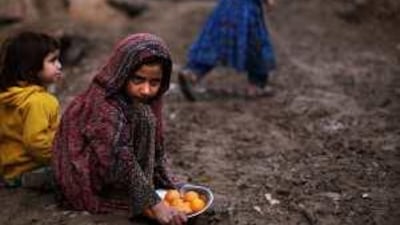ISLAMABAD // Having ended two years of haggling over power sharing by agreeing to sweeping constitutional reforms, Pakistan's political leaders are under growing public pressure to switch focus to the failing economy. The reforms, passed unanimously in the National Assembly on April 8 and await passage in the Senate, the upper house of parliament, this week, aim to strengthen civilian governance by ceding key executive powers from the presidency to the prime minister.
They also devolve most powers of governance from the federal government to the administrations of Pakistan's four provinces. Mindful of public discontent over the economy that is frequently taking the form of violent protests, politicians in government and opposition are calling for the reforms to be translated into action that benefits Pakistan's poor, who, according to political economists, make up some 75 per cent of the country's estimated population of 170 million.
The concerns were acknowledged by the president, Asif Ali Zardari, in a speech to activists of his Pakistan People's Party on April 3. "The government has spent the first two years of its tenure strengthening democracy and its institutions. We must dedicate the remaining three years to addressing the problems confronting the public." The economic challenges facing the government are formidable. Nadeem Malik, an Islamabad-based analyst and television programme host, said the government, elected after the December 2007 assassination of Benazir Bhutto, took power amid a crisis of investor confidence that, by August 2008, came close to causing a run on the rupee and leaving the country unable to pay for imported fuel and food.
"Foreign currency reserves flooded out at a billion dollars a month after the assassination of Ms Bhutto. If the IMF had not extended emergency support, our reserves would have been at zero and economic chaos would have ensued," Mr Malik said. A shortfall in power generation, equivalent to one-third of total demand for electricity, has exacerbated the crisis by causing the closure of 35 per cent of Pakistan's factories, rendering several million industrial workers unemployed.
Pakistan's poor have been further stung by a doubling of the prices of many staple foods and utility bills since 2008. The rise is attributed to a 30 per cent slide in the value of the rupee against the US dollar, artificial shortages created by commodity speculators, and the withdrawal of government subsidies. With the economy mired in recession and the cost of army operations against insurgents mounting, Yousaf Raza Gilani, the prime minister, announced in December that the government had halved its budgeted spending on development.
"We are caught in a vicious cycle and have not been able to find a way out of it," Mr Malik said in an interview in Islamabad recently. The recession and the apparent slowness of the government to respond have left many sceptical about the reforms and the benefits they are supposed to herald. "The politicians are looking at their self-interest and paying no attention to the public's problems," said Fazal Wahab, a university professor. "They make statements of intent, but nothing concrete is being done."
Workers in the city of Rawalpindi echoed his complaints. "What we need is the opportunity to make a living. Even the educated can't get a job because the opportunities that exist are given on the basis of nepotism, not merit," said Mohammed Aslam, a high school graduate who said poverty had forced him to abandon plans for a college education and to work as a building site watchman. Analysts said impetus for economic recovery would have to come in the form of financial assistance from Pakistan's allies, primarily the US, after the IMF wraps up its emergency programme in December.
The US Congress approved more than $2 billion (Dh7.3bn) in funding for Pakistan in October, but money has been slow to arrive, partly because of concerns it will be siphoned off by corrupt politicians and civil servants, but also because of interference by Pakistan's powerful military, which complained bitterly about clauses of the bill that require the US state department to certify that the military was not secretly colluding with the Afghan Taliban.
Mistrust between the governments has since been reduced and, after a "strategic dialogue" in Washington in March, the US has committed to helping the government overcome the power crisis and ease access to its markets for Pakistani exports. "It's been two years since the public voted against military dictatorship and in favour of the two major political parties, but Pakistan is still having policy dictated to it" by the US, said Raja Ashfaq, a wedding hall proprietor. "Meanwhile, the cost of a meal has quadrupled."
@Email:thussain@thenational.ae

